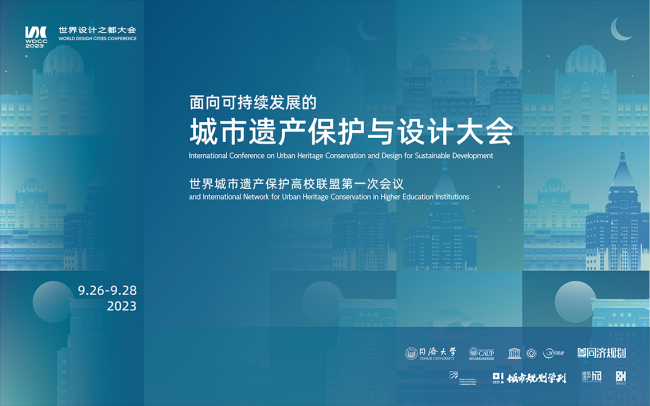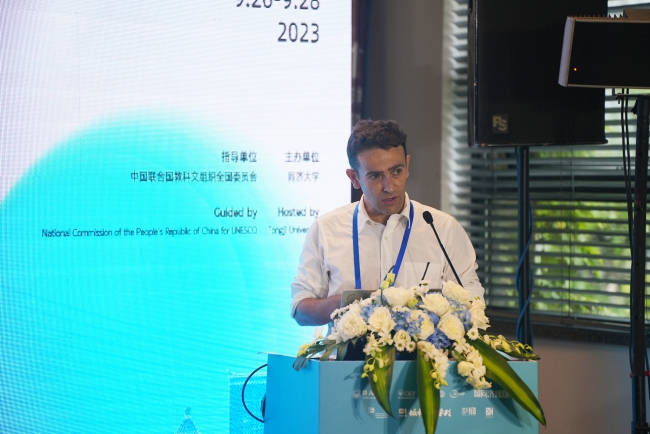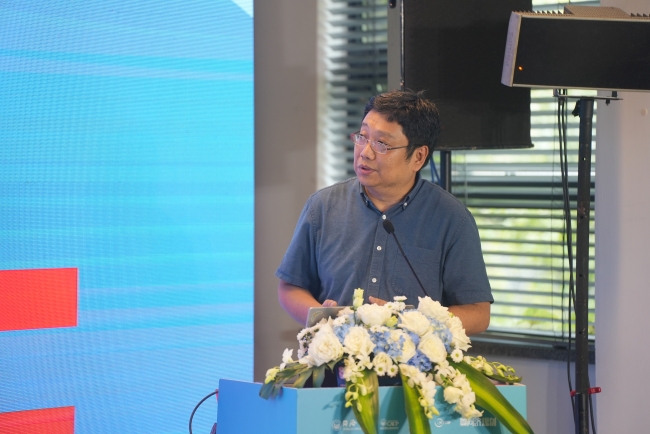| REVIEW | Summary of Thematic Session Three during the International Conference on Urban Heritage Conservation and Design for Sustainable Development |
| PublishDate:2023-11-01 Hits:1286 |
|
From 26 to 28 September 2023, the “International Conference on Urban Heritage Conservation and Design for Sustainable Development” and the first meeting on the establishment of the International Network for Urban Heritage Conservation in Higher Education Institutions were successfully held at the historic building of the former Lester Institute of Technical Education at Design Innovation Institute Shanghai and the Wenyuan Building at Tongji University campus. The conference was hosted by Tongji University and co-organized by the College of Architecture and Urban Planning (CAUP), World Heritage Institute of Training and Research for the Asia and Pacific Region (Shanghai), a Category 2 Centre under the auspices of UNESCO (WHITRAP Shanghai), and Shanghai Tongji Urban Planning and Design Institute Co., LTD (TJUPDI). The event was also presented as a forum during the 2023 World Design Cities Conference.
More than 35 participants attended the 3rd session themed “Workshop on Higher Education towards Sustainable Development Goals”. It was chaired by Prof. Zhang Peng and was designed as a workshop, held online and offline on the 27th afternoon. It proposed to discuss the initiative for an International Network for Urban Heritage Conservation in Higher Education Institutions. Its aim was to address educational practices and needs for urban conservation and development by inviting Universities and Higher Education Institutions and partner Institutions to share their experience and thinking on (1) Research; (2) Education; and (3) Action, with insight into their scope, goals, methods and outcomes as well as a focus on evolving needs and beneficiaries. To facilitate the discussions participants were invited to reflect on three preparatory questions:
1.Based on the Sustainable Development Goals, what are the study areas and approaches that require rethinking in the urban heritage conservation field, at the level of education, research, and action?
2.How can we combine traditional knowledge with modern technology in education, research and action for urban heritage conservation and sustainable development?
3.What are the main aims, motivations, and reasons for setting up and participating in this Network at the level of education, research and action?
Following a presentation of the aims of the session and its working method by Prof. Plácido González-Mártinez, Prof. Zhang Peng and Marie-Noël Tournoux respectively introduced Heritage Education at Tongji University and WHITRAP Shanghai.
Prof. Zhang Peng
Heritage Education at Tongji University
In his introduction, Prof. Zhang Peng presented the history and aims of Tongji’s College of Architecture and Urban Planning (CAUP) and its Research Supported Architectural Education approach and its key areas of New Architecture, Built Environment and Heritage. He further described the Built Heritage education strategy. He furthermore presented CAUP’s new undergraduate courses, Master, and PhD courses as well as the innovative Cross-Discipline Research Group integrating architecture, urban planning, landscape, civil engineering, history and survey. In the last part of his presentation, he focused on CAUP’s national and international cooperation and network activities.
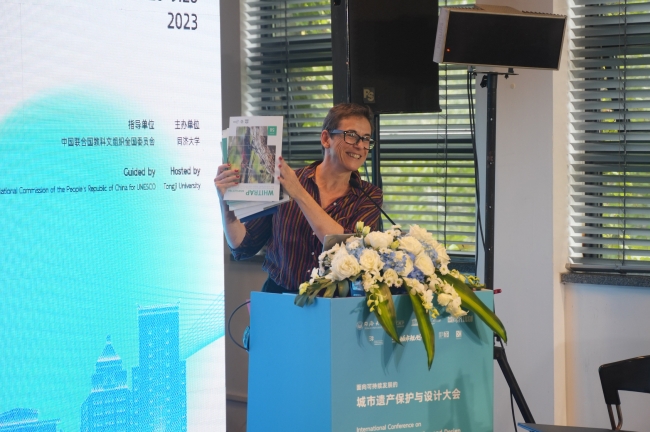 Marie-Noël Tournoux
Heritage Education at WHITRAP Shanghai
In her background introduction to WHITRAP, Marie-Noël Tournoux presented what are Category 2 Institute and Centres (C2C) under the auspices of UNESCO and their relation to the Organization. She continued by providing an overview of WHITRAP’s history and key objectives and some of the current main activities pertaining to training and raising awareness initiatives. She further explained how C2C engage with universities and WHITRAP’s special relationship with CAUP Tongji. She detailed how WHITRAP as a C2C allowed the development of regional and international cooperation, and served as an innovative platform and hub to implement joint and pilot activities.
These introductions were followed by presentations and round table discussions. Participants introduced their respective institutions, experience and approach to education, research, and existing networks and shared their reflections on the three preparatory questions. For the sake of greater efficiency, participants were distributed in three parallel small working groups, chaired by (1) Prof. Zhang Peng, (2) Prof. Plácido González-Mártinez and (3) Marie-Noël Tournoux.
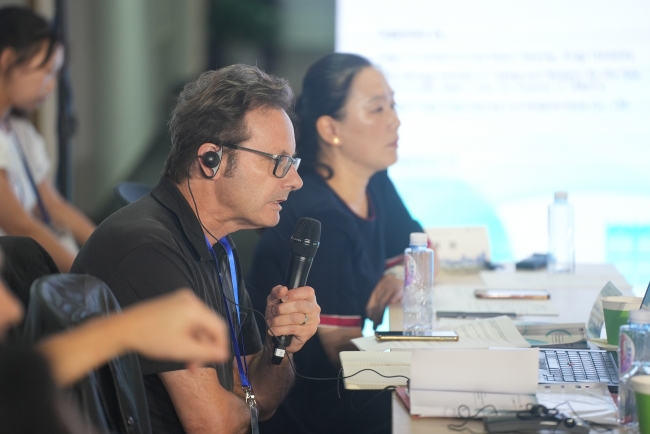 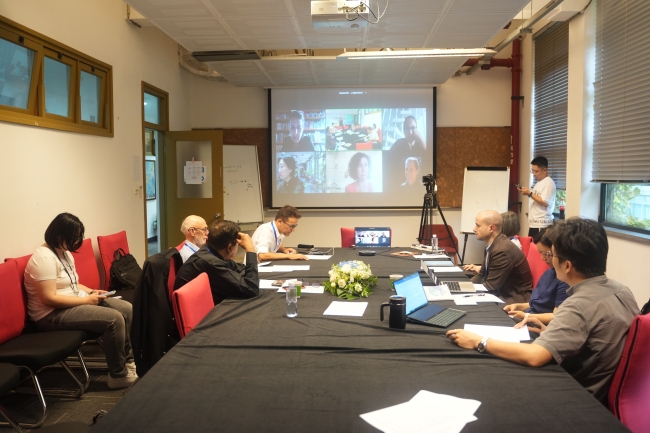 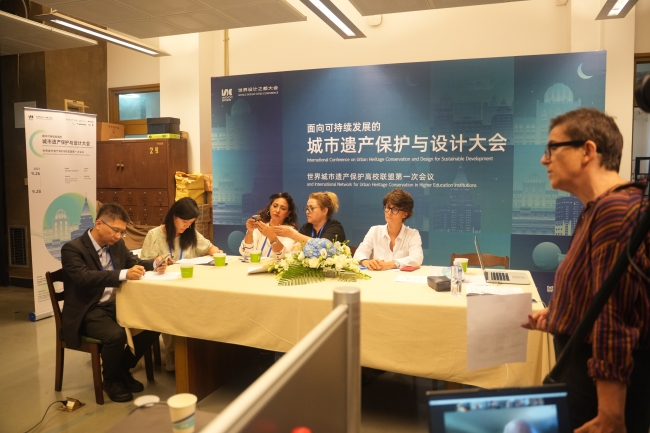 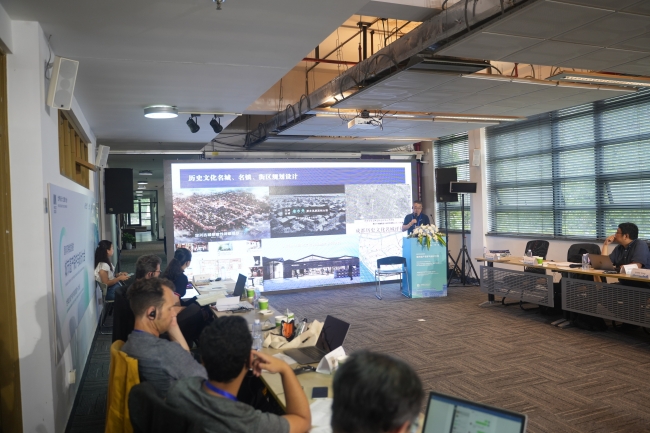 Photos of the activity
There were many topics covered during the Workshop and many came back in the discussions on each of the three questions. Participants stressed the need to consider traditional knowledge systems, which should come together with modern technology. Linking the two allows to expand the boundaries of disciplines and further the knowledge of heritage for conservation, management, project design, and decision-making purposes as well as for facilitating interpretation and knowledge sharing to a wider audience. Discussions highlighted the importance of observation be it through new technologies or hand drawing, reaching out to stakeholders, such as local communities, outside the academic world, interdisciplinary approaches as well as relinking theory and practice. Pluri-disciplinary approaches were considered a priority (including social sciences, engineering, new technologies and economics) as well as transversality between institutions and different types of stakeholders. Throughout the discussions Climate Change, the wellbeing of populations, and contributing to reaching the Sustainable Development Goals also came back as key challenges to address. They furthermore stressed the importance of considering the role and function of heritage differently, looking at heritage as a solution and not only as an object and considering its “learn-from” quality to provide sustainable and resilient responses to key threats and allow to meet the Sustainable Development Goals. They insisted on the need to qualitatively value the strength of heritage to quantitatively demonstrate its power.
The participants all underlined the need to act and think differently, insisting on the responsibility of universities and higher education institutions to develop new approaches to integrate conservation and development in Higher Education. This means not only rethinking the conceptual content of curricula but also developing new educational models and practices, including creating practicioner doctorates to allow "dirty hands" to be certified by universities. Furthermore, they encouraged reconsidering the physical setting of higher education institutions, and revising the teaching-learning experience with a focus on problem-solving and practice-oriented methods and diplomas. The way forward was initiating long-term structural reforms inspired by pilot educational experiences. All underlined how theory should inform and improve methodologies used in practice. Sharing experiences and networking were addressed extensively in the discussions on the three topics.
Presentations showcased the rich and multifaceted expertise, diversity of pedagogical approaches, and attention to innovating and meeting today’s contemporary requirements and needs. They also detailed the multiple forms of knowledge production systems in multiple areas of urban heritage conservation held by different universities and higher education institutions. Participants discussed how a network could contribute to filling the research gaps and contribute to competency building. Field projects were largely praised for engaging with stakeholders outside academia and as a way to address crucial issues such as governance and challenging stereotyped development models, in particular economic models in heritage and development processes. Formal cooperation between institutions allowing student and faculty exchanges, experimental pedagogy through Summer School or fieldwork, and innovative research, as well as access to sources of funding based on national and international incentives was highly supported. All in all, the participants provided very rich ideas for defining the next steps, research topics, seminars, training sessions as well as joint projects.
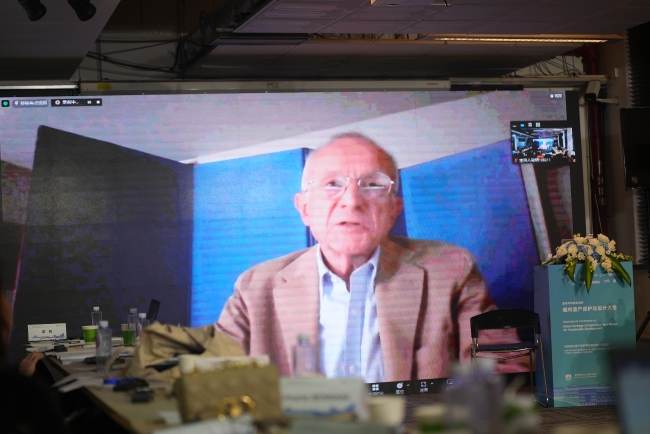 The results of the working groups were presented in the plenary followed by thoughtful reflections by Prof. Benjamin Mouton based on the participant’s written contributions and his reflection. Prof. Benjamin Mouton, first commented on heritage and sustainable development as two decisive concepts, which are now at the forefront of international discussions when it comes to the future of the planet. He developed 5 key points. In his first point, he stressed that Heritage should be considered as a whole, which varies in scale, types and time and is not solely what still stands. He further commented on Sustainable Development, highlighting the paradox of the combination of the two terms. As one term conveys the notions of transformation of societies, implicitly of progress and opens the discussion on the legitimacy of growth. Whilst the other conveys the notion of duration, stability, and permanence. From the combination of these two contrary terms arises the notion of improving the living conditions of Humankind in its environment. His third point focused on how few tangible heritage features have remained unchanged in time and are therefore more or less easy to understand. Vernacular heritage, and rural and small urban settlements have kept a higher level of integrity because as they have been often neglected, they have undergone little transformation. He further underlined how vernacular heritage could provide answers to the challenges of tomorrow’s society and provide solutions to the impact of climate change. In the fourth point, he insisted on the relevance of traditional knowledge systems as part of modernity and how crucial it was to stop opposing the present, and the future. He warned against the illusion of substituting modern technologies for traditional knowledge, but continued, by explaining how modern technologies could provide in-depth analyses of heritage and improve conservation processes. He insisted on how the role of traditional knowledge systems was a key component of sustainable development. In his fifth and last point, he addressed the issue of “should we keep everything?” And what are the acceptable transformation criteria? He stressed that the issue was less about knowledge than about methodology and analysis. It is the common denominator that should prevail at the international level, for the equitable conservation of all heritage, and not only “World Heritage” which is only a special case.
Session 3 was followed by the Closing Ceremony. Marie-Noël Tournoux and Prof. Plácido González-Mártinez respectively provided a summary of sessions 1 and 2 and the main outcomes of session 3. Prof. Shao Yong, Executive Director of WHITRAP Shanghai followed by presenting the draft Initiative on Urban Heritage Conservation and Design for Sustainable Development and Roadmap for Urban Heritage Conservation in Higher Education Institutions. The participants reached a consensus on the common objective of the Network: to improve, through their contribution from the academic sector, the quality of the historic urban landscape. Considering the lively and high-level debates, participants agreed on the relevance of the fruitful cooperation which is being initiated for building together a bright future for heritage education. The participants were asked to provide feedback on this draft document, to develop a Network structure and strategy, to be used as a reference by the members in the future.
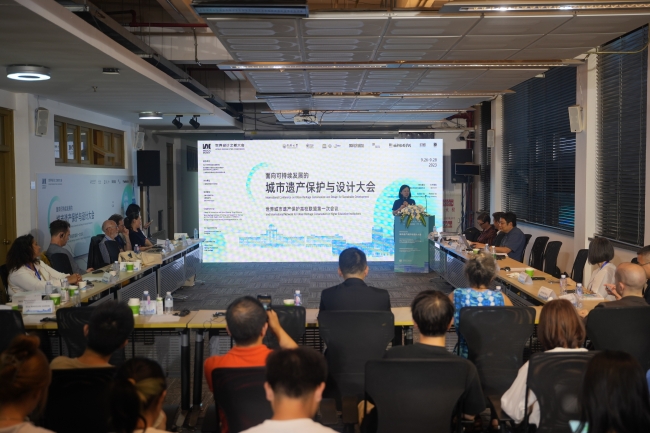 Initiative on Urban Heritage Conservation and Design for Sustainable Development and Roadmap for Urban Heritage Conservation in Higher Education Institutions (draft)
1. On 26 to 28 September 2023, Tongji University, as host, together with the College of Architecture and Urban Planning (CAUP), the World Heritage Institute of Training and Research for the Asia and the Pacific Region, a Category 2 Centre under the auspices of UNESCO (WHITRAP Shanghai), Shanghai Tongji Urban Planning & Design Institute Co. Ltd (TJUPDI), co-organized an International Conference on Urban Heritage Conservation and Design for Sustainable Development and held the first meeting on the establishment of the International Network for Urban Heritage Conservation in Higher Education Institutions.
2. The participants reflected on three main areas of interest Education, Research and Action and in particular discussed three questions: Question 1: Based on the Sustainable Development Goals, what are the study areas and approaches that require rethinking in the urban heritage conservation field, at the level of education, research, and action?
Question 2: How can we combine traditional knowledge with modern technology in education, research and action for urban heritage conservation and sustainable development?
Question 3: What are the main reasons, aims and forms for setting up and participating in this Network at the level of education, research, and action?
3. They, furthermore, discussed the setting up of an International Network for Urban Heritage Conservation in Higher Education Institutions which would aim to strengthen cooperation with and among Universities and Higher Education Institutions that have recognized urban heritage conservation as a key subject of their teaching, research, and action plans.
4. The participants highlighted Universities and Higher Education Institutions share a common goal: to improve, through their contribution from the academic sector, the quality of the historic urban landscape. Members of the Network acknowledged their commitment to sharing best practices, and developing partnerships that promote urban heritage conservation and sustainable development in their research, education and action agendas.
5. The Network would aim to:
6. Following the conference, WHITRAP Shanghai and CAUP Tongji will develop a program proposal and schedule pointing at possible contributions from the members. This will include the definition of practical and operational considerations and defining the formal partnerships and statutory membership frameworks. Considering the lively and high-level debates, participants agreed on the relevance of the fruitful cooperation which is being initiated for building together a bright future for heritage education.
Contributed by: Marie-Noël Tournoux, Pei Jieting
Edited by: Jiang Yunyang(Intern)
|
- News | WHITRAP Shanghai and CNR-ISPC bilateral meeting
- News | WHITRAP meets Cité de l’Architecture et du Patrimoine
- WHITRAP Hosting "Workshop on Preliminary Assessment for National Focal Points of the Asia Region" in Chengdu
- WHITRAP Shanghai meets UNESCO
- INTERNATIONAL CONFERENCE PRELIMINARY ANNOUNCEMENT & CALL FOR PAPERS
- Observation of the 46th Session of the World Heritage Committee
Copyright © 2009-2012 World Heritage Institute of Training and Research-Asia and Pacific (shanghai)


